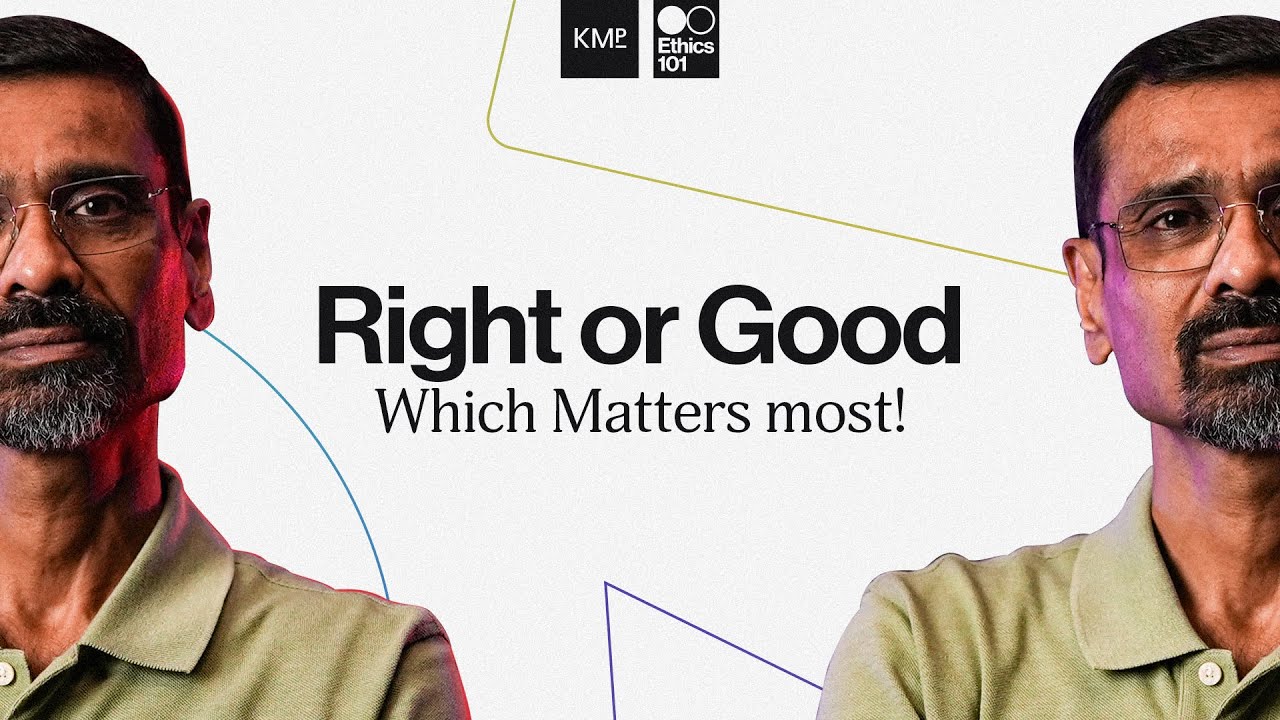Lecture 08
Summary
TLDRThis module delves into moral philosophy, examining concepts like good, right, duty, justice, equality, and love. It discusses the challenges of defining 'good' and the ambiguity it holds in different contexts. The lecture touches on the complexities of rights, the tension between duty and love, and the varying interpretations of justice and equality. It also introduces 'Purusharthas,' the four goals of life in Indian philosophy. The session aims to equip students with the ability to identify moral positions and engage in ethical decision-making.
Takeaways
- 🔍 The course module delves into philosophical concepts such as good, right, duty, justice, equality, love, and purusharthas to understand their moral implications.
- 🤔 Defining 'good' is challenging; it's easier to identify a good person but difficult to articulate what 'good' means, highlighting the complexity of philosophical terms.
- 🗡️ The concept of 'good' varies; a good knife is functional, while a good person is morally commendable, indicating different interpretations based on context.
- 🤝 Differences in opinion often stem from varied interpretations of philosophical terms, emphasizing the importance of understanding others' viewpoints.
- 📚 Philosophical discourse is crucial for defining terms like 'good' and understanding their implications on individual and societal levels.
- ⚖️ 'Rights' can be understood as being correct or incorrect and as entitlements, with the interpretation depending on one's frame of reference.
- 💼 The concept of 'duty' is linked to one's role in life, but prioritizing duties and understanding what motivates them (duty vs. love) can be complex.
- ❤️ The tension between duty and love as moral motivators is highlighted, with different cultures valuing one over the other.
- ⚖️ 'Justice' is a multifaceted concept, with disputes often arising from differing views on what constitutes just action or punishment.
- 🌐 'Equality' is a widely supported term, but its meaning—whether of opportunity, outcome, or other—varies, leading to different interpretations and policies.
- 🧘 'Purusharthas' refers to the goals of human life according to Indian Philosophy, which include Dharma, Artha, Kama, and Moksha, adding a cultural perspective to moral concepts.
Q & A
What is the main focus of the second module in the course on Moral Thinking?
-The second module focuses on exploring philosophical concepts such as good, right, duty, justice, equality, love, and purusharthas, and how they are understood and applied in various contexts.
Why is it difficult to define the term 'good'?
-Defining 'good' is challenging because it is a philosophical term that is also used colloquially. While it's easy to identify goodness in people or objects, providing a precise definition requires a level of accuracy and rigor that is not present in everyday usage.
What is the difference between a 'good knife' and a 'good person' as per the script?
-A 'good knife' is defined by its functionality, specifically its ability to cut well. In contrast, a 'good person' is characterized by moral qualities rather than functional excellence.
How do philosophical terms influence the character of an individual or a nation?
-The way philosophical terms are theorized and articulated shapes the moral framework that guides the behavior and decisions of individuals, organizations, and nations.
What is the importance of understanding the other's point of view when engaging with differences of opinion?
-Understanding the other's point of view is crucial for meaningful dialogue and argumentation. It allows for a deeper comprehension of differing philosophical concepts and worldviews, fostering learning and the pursuit of truth.
What is the script's stance on the relationship between duty and love?
-The script presents a tension between duty and love as moral motivators. It suggests that different cultures and philosophies may prioritize one over the other, and it questions which should be chosen when there is a conflict between the two.
How does the script differentiate between 'right' as opposed to 'wrong' and 'right' as human rights?
-The script differentiates 'right' as opposed to 'wrong' as a judgment of moral correctness, while 'right' as human rights refers to entitlements that individuals have, which may be distinct from moral judgments.
What is the complexity surrounding the concept of justice as discussed in the script?
-The script highlights the complexity of justice by showing how different groups might fight for justice with differing interpretations of what constitutes justice, such as revenge versus state-administered punishment.
What types of equality are mentioned in the script, and what are the challenges associated with them?
-The script mentions equality of opportunity and equality of outcome. The challenges include the impossibility of true equality of opportunity due to inherent genetic differences and the practical and philosophical issues with enforcing equality of outcome.
What are 'Purusharthas' and how do they relate to the goals of human life in Indian Philosophy?
-Purusharthas are the goals of human life in Indian Philosophy, which include Dharma (duty), Artha (wealth), Kama (desire), and Moksha (liberation). They represent the multifaceted aspects that give meaning to human life.
What is the ultimate aim for students after completing the course on Moral Thinking?
-The ultimate aim is for students to be able to identify moral positions, construct moral arguments using moral concepts, and engage in ethical decision-making.
Outlines

This section is available to paid users only. Please upgrade to access this part.
Upgrade NowMindmap

This section is available to paid users only. Please upgrade to access this part.
Upgrade NowKeywords

This section is available to paid users only. Please upgrade to access this part.
Upgrade NowHighlights

This section is available to paid users only. Please upgrade to access this part.
Upgrade NowTranscripts

This section is available to paid users only. Please upgrade to access this part.
Upgrade Now5.0 / 5 (0 votes)





